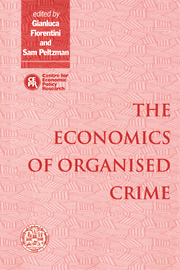Book contents
- Frontmatter
- Contents
- List of figures
- List of tables
- Foreword
- Acknowledgements
- List of conference participants
- 1 Introduction
- PART I THEORIES OF THE STATE AND THE ORIGIN OF CRIMINAL ORGANISATIONS
- 2 Organised crime, mafia and governments
- Discussion
- 3 Gangs as primitive states
- Discussion
- PART II THE CRIMINAL ORGANISATION AS A FIRM
- PART III ORGANISED CRIME AND STATE INTERVENTION IN THE ECONOMY
- PART IV DETERRENCE POLICIES AGAINST LEGAL FIRMS INVOLVED IN ILLEGAL ACTIVITIES
- PART V DETERRENCE POLICIES AGAINST ORGANISED CRIME
- Index
Discussion
Published online by Cambridge University Press: 04 August 2010
- Frontmatter
- Contents
- List of figures
- List of tables
- Foreword
- Acknowledgements
- List of conference participants
- 1 Introduction
- PART I THEORIES OF THE STATE AND THE ORIGIN OF CRIMINAL ORGANISATIONS
- 2 Organised crime, mafia and governments
- Discussion
- 3 Gangs as primitive states
- Discussion
- PART II THE CRIMINAL ORGANISATION AS A FIRM
- PART III ORGANISED CRIME AND STATE INTERVENTION IN THE ECONOMY
- PART IV DETERRENCE POLICIES AGAINST LEGAL FIRMS INVOLVED IN ILLEGAL ACTIVITIES
- PART V DETERRENCE POLICIES AGAINST ORGANISED CRIME
- Index
Summary
In this stimulating essay, Annelise Anderson discusses questions of great importance for understanding the organisational structure of the mafia and the relationship between mafia and government. Here I shall examine the central theme of the essay and the scope of the approach she suggests. The main aim of ‘Organised Crime, Mafia and Governments’, in the author's own words, is ‘to explore the application of one relatively recent development in economic theory – the transaction cost approach – to the problems of the mafia in Sicily’ (p. 47).
As is by now well known, Transaction Cost Economics is one of the principal branches of research of New Institutional Economics, and is closely associated with the name of Oliver Williamson. Ms Anderson gives a concise account of the main features of Transaction Cost Economics – the aim of which is to demonstrate that transactions with different attributes are assigned to different governance structures so as to economise on transaction costs – and she suggests that this approach could be useful in analyses of the Italian and US mafias. In particular, she proposes considering the mafia to be a governance structure. In her historical interpretation, the author argues that the American mafia became a governance structure long before the Sicilian mafia. The latter is said to have achieved this status only in the second half of the 1950s, when the cupola was established.
Having chosen to regard the mafia as a governance structure, Ms Anderson criticises the widespread opinion that the mafia is a firm.
- Type
- Chapter
- Information
- The Economics of Organised Crime , pp. 54 - 60Publisher: Cambridge University PressPrint publication year: 1996

